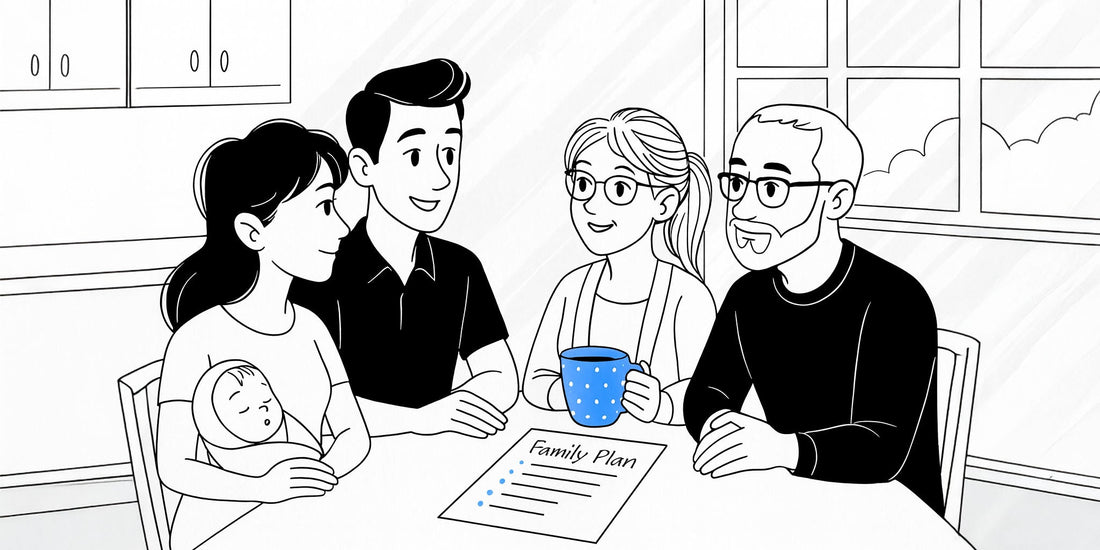
How to Prepare Grandparents for Baby: Setting Boundaries Before Birth
Share
Written by DeeDee Moore
When you're expecting a baby, the to-do list feels endless. Birth plan? Check. Pediatrician who takes your insurance? Working on it. Nursery setup, car seat installation, diaper brand debates—the preparations stretch on and on. Between researching cribs and comparing stroller reviews, it's easy to feel like you're drowning in decisions.
But here's something that might not be on your radar yet: preparing your parents and in-laws to become grandparents.
Your relationship with them is about to shift in ways you might not expect. And while you can't control how they'll handle this transition, you can set everyone up for success by recognizing that a real shift needs to happen—and having some intentional conversations about it.
Why Grandparents Overstep Boundaries (And What It Really Means)
If you spend any time in parent forums or scrolling social media, you've probably seen the stories. Grandparents who show up unannounced. Grandparents who ignore feeding schedules or safety guidelines. Grandparents who undermine parenting decisions with a dismissive "we did it differently in my day, and you turned out fine."
While social media isn't always an accurate reflection of real life, this much is true: too many grandparents step into their new role believing they can do whatever they want with their grandchildren. Messages like "spoil 'em and send 'em home" reinforce the idea that a grandparent's job is all fun and no responsibility to support the actual parents.
Sometimes it's the grandparents who feel closest to their children who end up overstepping the most. When you have a great relationship with your parents or in-laws, it can feel natural for them to assume they'll have unlimited access and influence. But closeness doesn't automatically translate into understanding boundaries or respecting your role as the parent.
How to Update Grandparents on Modern Parenting Guidelines
Here's another reality: grandparents don't always come into their new role with the information they need to be truly helpful. Their parenting experience is absolutely valid, but some of it may be outdated. Car seat safety standards have changed. Safe sleep guidelines have evolved. Even basic care recommendations look different than they did twenty or thirty years ago.
This isn't about dismissing their wisdom—it's about acknowledging that being helpful sometimes means staying current. When grandparents understand today's safety standards and care recommendations, they can support you more effectively and worry less about whether they're doing things "right."
Setting Grandparent Boundaries: What to Discuss Before Baby Arrives
If you're hoping the grandparents in your baby's life will be involved in ways that are supportive and considerate, it's worth taking time now to share what that looks like to you.
Think about having conversations with all the expectant grandparents about how you'd like them to be part of your child's life. Let them know you recognize the importance of their role and that you hope they'll approach grandparenting with intention. Find out what their vision of grandparenting is, and talk through any areas that might not align with your values.
Some areas worth discussing might include:
- Who you want to be there for the birth and the days that follow
- Visits and communication (frequency, advance notice, length of stays)
- Safety practices and current guidelines
- Gift-giving and spoiling boundaries
- Sharing photos or information on social media
But make sure to leave yourself some wiggle room: Your priorities and comfort level may change after the baby arrives. You don't have to figure it all out now, but establishing that you want to have open conversations about these things will serve you well in the long run.
How Clear Expectations Help New Grandparents Succeed
What you're really offering when you have these conversations isn't a list of rules—it's clarity. Most grandparents genuinely want to be helpful and supportive. When they understand what that looks like to you, they can step into their role with confidence instead of guessing.
Let them know that you want to be able to come to one another with any concerns about family dynamics as things change. Frame it as a team effort: you're all learning how to navigate these new relationships together.
How to Talk to Grandparents About Boundaries
These discussions don't have to be formal or intimidating. You might bring it up during a family dinner or while you're putting together the nursery together. The key is approaching it from a place of excitement about their involvement rather than fear about potential problems.
Try something like: "We're so excited for you to be a grandparent, and we'd love to talk about how we can all work together to make this transition smooth for everyone."
Remember, you're not asking them to sign a contract—you're inviting them into an ongoing conversation about how your family will work together. Some grandparents might be immediately receptive; others might need time to process or push back on certain boundaries. That's okay. The goal isn't perfect agreement right away; it's establishing that these conversations matter and will continue.
If you're feeling uncertain about how to navigate these conversations, you're not alone. That's exactly why More Than Grand offers ”How To Talk So Grandparents Will Listen”, a free guide that gives parents the tools to set boundaries with confidence and compassion. It includes conversation starters, sample scripts for common challenges, and strategies for maintaining relationships even when discussions get difficult.
Building Strong Grandparent Relationships That Last
Taking time now to prepare grandparents for their new role isn't just about avoiding conflict—though it certainly can help with that. It's about setting up relationships that can grow and thrive as your child does.
When grandparents understand their role and feel confident in how to support your family, everyone benefits. Your child gets grandparents who are truly helpful rather than just well-meaning. You get the support you actually need rather than the kind that creates more work. And grandparents get the joy of being meaningfully involved in their grandchild's life.
It's one more thing to add to that ever-growing list of baby preparations. But unlike researching the perfect stroller, this preparation has the potential to shape your family's relationships for years to come.

About the author:
DeeDee Moore created More Than Grand to help today’s grandparents show up with confidence and care. Her blog and social media offer realistic tips, modern child care insights, and heartfelt ways to support both new parents and grandkids. Find her at MoreThanGrand.com or @morethangrand.
